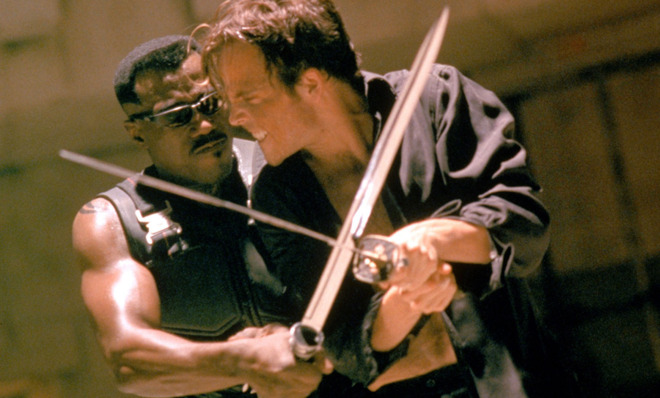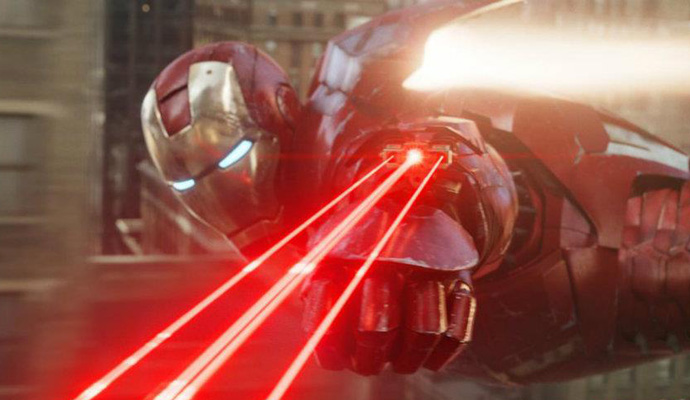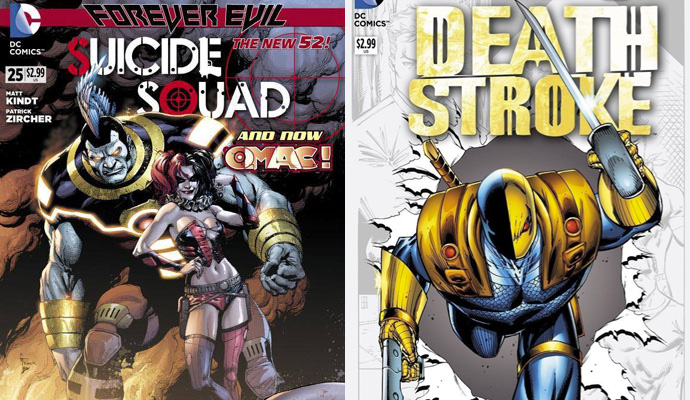Coming soon: A different kind of superhero movie
David Goyer's interpretations of Suicide Squad and Deathstroke could inject some much-needed diversity into the superhero genre


A free daily email with the biggest news stories of the day – and the best features from TheWeek.com
You are now subscribed
Your newsletter sign-up was successful
Hollywood's pantheon of superheroes just got a little more crowded.
On Wednesday, Warner Bros. announced that Gal Gadot — best known for her supporting role in the Fast & Furious franchise — will appear in the upcoming Man of Steel sequel as Wonder Woman, opposite Henry Cavill's Superman and Ben Affleck's Batman. It's a welcome announcement, but a report from earlier in the week, which drew far less attention, may have far larger ramifications for DC Comics' future on the big screen.
According to a source at Bleeding Cool, David Goyer — one of the writers behind the Dark Knight trilogy, along with Man of Steel and its upcoming sequel — is also developing several smaller projects based on relatively obscure DC Comics titles, including Suicide Squad, Booster Gold, Deathstroke, and Team 7. Each of those projects will reportedly be budgeted at somewhere between $20 million to $40 million. And if Goyer plans to remain faithful to the source material, they may finally be the first truly adult-oriented superhero movies to make a big splash on the big screen.
The Week
Escape your echo chamber. Get the facts behind the news, plus analysis from multiple perspectives.

Sign up for The Week's Free Newsletters
From our morning news briefing to a weekly Good News Newsletter, get the best of The Week delivered directly to your inbox.
From our morning news briefing to a weekly Good News Newsletter, get the best of The Week delivered directly to your inbox.
It's also the first news indicating that DC plans to do anything other than emulate the same kind of cinematic universe that Marvel has built with its own stable of superheroes. It's hard to argue with Marvel's strategy, which has allowed them to amass a staggeringly lucrative cinematic empire in just five years. Iron Man, The Incredible Hulk, Thor, and Captain America begat The Avengers — the third highest-grossing movie in history — which subsequently begat ABC's Agents of S.H.I.E.L.D. and turned the Thor sequel into a bigger hit than the original. But the sameness of their approach is starting to set in. As Star Trek: Into Darkness writer Damon Lindelof recently conceded in an interview with New York Magazine, injecting more money into a franchise tends to have a homogenizing effect: "Once you spend more than $100 million on a movie, you have to save the world."

Unfortunately, that effect has since grown into one of the foundations of the superhero genre, and it's reflected in both the sky-high budgets and the family-friendly ratings of the modern superhero movies. Some context: There are 38 superhero movies rated G, PG, and PG-13 that earned more at the box-office than Warner Bros.' underperforming Watchmen — the first R-rated superhero movie to appear on the list. The other R-rated superhero movies are similar oddities. There's the Goyer-penned Blade trilogy, which came before the current wave of superhero blockbusters (and which many viewers never realized was based on a comic). There's Kick-Ass and its sequel, which earned a cult following by offering a bloodier riff on superhero tropes. There are 90s oddities like Judge Dredd and Darkman, and two failed attempts to launch a franchise based on The Punisher. At the very bottom of the list are Orgazmo, Super, and The Specials — three adult-oriented, micro-budgeted oddities that never earned more than a tiny but devoted following on home video. Those kinds of movies have since dropped off altogether.
But all that repetition means that there has never been a riper time to introduce a little more diversity into the superhero genre, which feels a little more shopworn with every new movie featuring an origin story or earth-shaking threat. To be fair, Marvel clearly realizes this is a problem on their horizon: Thor: The Dark World is as much a Lord of the Rings-style fantasy epic as a superhero movie, and the upcoming Captain America: The Winter Soldier has been described as a '70s style Cold War thriller. But despite their stabs at cross-genre appeal, each of those movies cost well over $100 million to produce — and consequently, each movie has the same larger-than-life stakes as the rest of Marvel's lineup.
By contrast, the DC Universe has the more offbeat properties proposed by Goyer, which include titles like Deathstroke and Suicide Squad. As the titles indicate, these comics are packed with characters far darker than the superheroes that have conquered the box-office in recent years. Deathstroke is a brutally violent, antiheroic mercenary, and the Suicide Squad is the DC Universe equivalent of the Dirty Dozen — a team of incarcerated supervillains sent on high-risk missions by the U.S. government in exchange for commuted sentences.
A free daily email with the biggest news stories of the day – and the best features from TheWeek.com

The news that Warner Bros. might be tackling some of DC Comics' rougher character wouldn't necessarily be cause for celebration on its own. There are plenty of comic-book characters — including Daredevil, John Constantine, and Spawn — whose more adult-oriented stories were ignored in favor of something with a little more mass appeal. Nor does an R-rating necessarily indicate a better take on the material; Christopher Nolan's Dark Knight trilogy was plenty adult without extending beyond a PG-13, and Kick-Ass' R-rating didn't make it any more mature than its box-office rivals.
But whatever the execution, the basic concept of lower-budgeted titles based on lesser-known characters is an enormously refreshing change from the tiny box Hollywood currently places superhero comics in. There are so many superhero movies in the pipeline right now that it's time to stop thinking of them as a subgenre of the action movie and time to start thinking of them as a genre of their own — capable of telling stories that can be compelling and lucrative with diversity in tone, budget, or rating. Fortunately, it shouldn't be too hard; superhero comics have always been more diverse than the stories that have recently made it to the big screen. It's a truth that Hollywood's older superhero movies, for all their flaws, actually used to reflect — and it's the perfect time to get back there again.
Scott Meslow is the entertainment editor for TheWeek.com. He has written about film and television at publications including The Atlantic, POLITICO Magazine, and Vulture.
-
 The ‘ravenous’ demand for Cornish minerals
The ‘ravenous’ demand for Cornish mineralsUnder the Radar Growing need for critical minerals to power tech has intensified ‘appetite’ for lithium, which could be a ‘huge boon’ for local economy
-
 Why are election experts taking Trump’s midterm threats seriously?
Why are election experts taking Trump’s midterm threats seriously?IN THE SPOTLIGHT As the president muses about polling place deployments and a centralized electoral system aimed at one-party control, lawmakers are taking this administration at its word
-
 ‘Restaurateurs have become millionaires’
‘Restaurateurs have become millionaires’Instant Opinion Opinion, comment and editorials of the day
